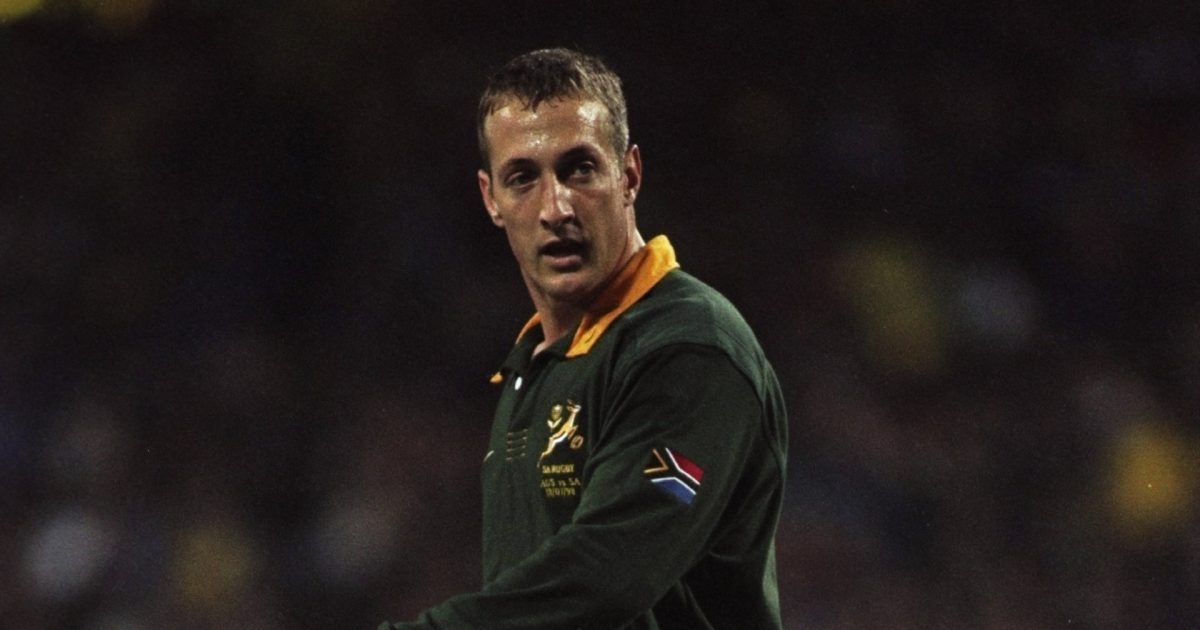Ex-Springbok Terblanche included in 30-strong World Cup judiciary team

World Rugby have named a 30-strong team of disciplinary officials for the upcoming Rugby World Cup in France, a selection that includes former Springboks back Stefan Terblanche who played for his country at the finals in 1999 and 2003.
The South African has been named as part of the 12-strong group of judicial panel members, which also has the likes of former Wallabies lock John Langford, ex-England back Leon Lloyd, former Wales lock Olly Kohn and ex-Scotland coach Frank Hadden involved.
Eight citing commissioners have been named along with 10 judicial chairs in an announcement that follows last month’s confirmation of the 12 referees chosen to take charge of the games at the 48-match tournament.
A statement read: “Widened global and gender representation are at the heart of an experienced team of citing commissioners and judicial officials selected for Rugby World Cup 2023 in France.
“With 13 nations represented within the team, the selection made on merit underscores the pathways and processes implemented under independent judicial panel chairman Christopher Quinlan and citing commissioner manager Steve Hinds to broaden representation and deepen the talent pool.
“Continuing the central mission to deepen understanding and empathy with the playing environment, the selection features a strong blend of former players, coaches and referees and experienced chairs. All come into the tournament with significant international rugby experience.
“Within the judicial panel, Rugby World Cup 2014 winner Becky Essex, Rugby World Cup participants Stefan Terblanche (South Africa), Aiolupotea Tonu’u Ofisa Junior Tonu’u and Mike Mika (former Samoa and New Zealand internationals), former Scotland coach Frank Hadden and former international referee Donal Courtney (Ireland) all have significant Rugby World Cup experience.
“The panel of eight citing commissioners is also brimming with significant international rugby experience with five members having previously been selected for Rugby World Cups.
Importantly, a consistent approach will operate across the match officiating, citing and judicial approach at France 2023. This is underpinned by regular joint calibration sessions across the respective teams, often involving coaches and players. This is central to common understanding.”
World Rugby chairman Bill Beaumont said: “Collectively, we are striving for accurate, clear and consistent decision-making and player welfare is our top priority. It can be a complex area, particularly on-field, but this is a very talented, motivated and aligned group who are on the side of rugby.”
Principles of the RWC 2023 disciplinary process:
- Three-person judicial committees will be appointed comprising a judicial chair and two panel members from a panel of experienced former international coaches, players and referees;
- As at previous Rugby World Cups, a citing commissioner from a neutral country will be appointed for each of the 48 matches in the tournament. The citing commissioner will review the match live and will have access to all the available angles and Hawk-Eye multi-camera feeds. The citing window will operate until 36 hours after the conclusion of the match;
- Teams may refer incidents of alleged foul play to the citing commissioner for review within 12 hours of the conclusion of the match, but only the citing commissioner has the power to cite a player;
- Disciplinary hearings will be convened within 48 hours of the match in order not to adversely impact on team preparation and decisions published immediately on conclusion;
- The appeal window is 48 hours from the notification of the decision.
Citing Commissioners (8): Shaun Gallagher (England)*, Deker Govender (South Africa), Adrien Menez (France), Michael O’Leary (New Zealand)*, David Pelton (USA)*, James Sherriff (Australia), Murray Whyte (Ireland)* and Danae Zamboulis (England).
Judicial chairs (10): Adam Casselden (Australia)*, Jean-Noël Couraud (France)*, James Dingemans (England)*, Jennifer Donovan (Ireland), Roddy Dunlop KC (Scotland), Mike Hamlin (England)*, Brenda Heather-Latu (Samoa), Nigel Hampton (New Zealand)*, Shao-Ing Wang (Singapore)*, and Rhian Williams (Wales).
Judicial panel members (12): Donal Courtney (Ireland, former international referee)*, Jamie Corsi (Wales, former player), Becky Essex (England, played at RWC 2010 and 2014), Frank Hadden (Scotland, head coach at RWC 2007)*, Olly Kohn (former Wales international)*, John Langford (former Australia international)*, Leon Lloyd (former England international)*, Mike Mika (New Zealand, played at RWC 1995 and 1999 for Samoa), Juan Pablo Spirandelli (Argentina, former international referee), Stefan Terblanche (South Africa, played at RWC 1999 and 2003)*, Valeriu Toma (Romania, former international assistant referee)*, and Aiolupotea Tonu’u Ofisa Junior Tonu’u (New Zealand, former Samoa dual international rugby and cricket and former New Zealand international).
*Denotes previous Rugby World Cup experience





























